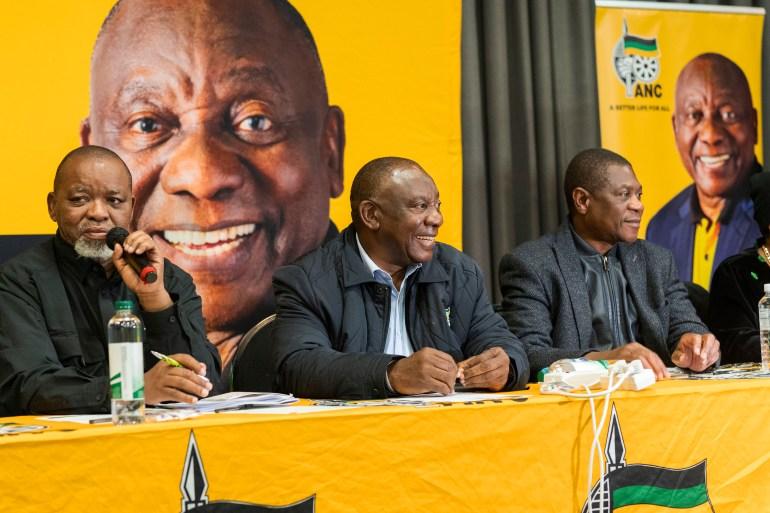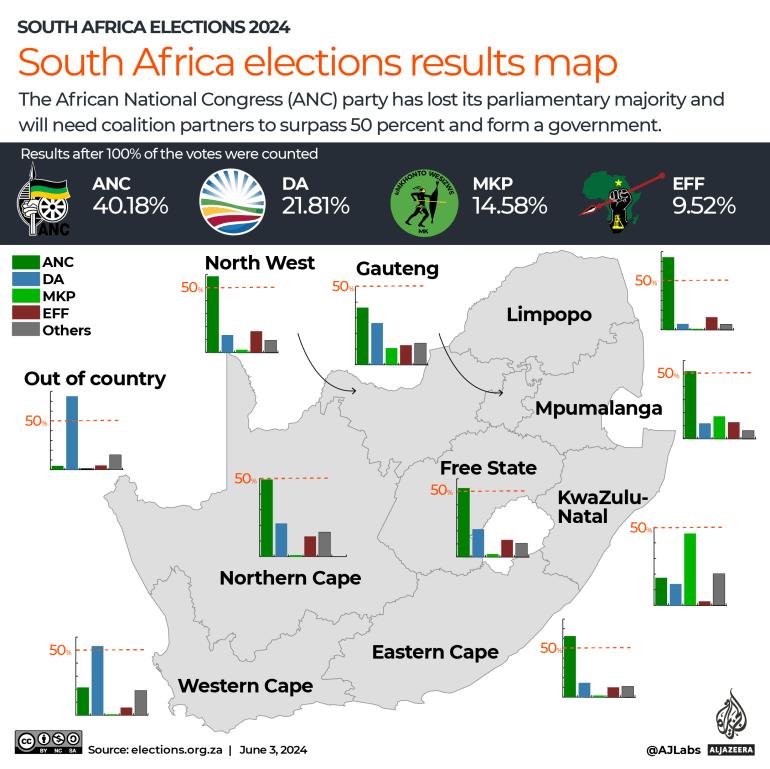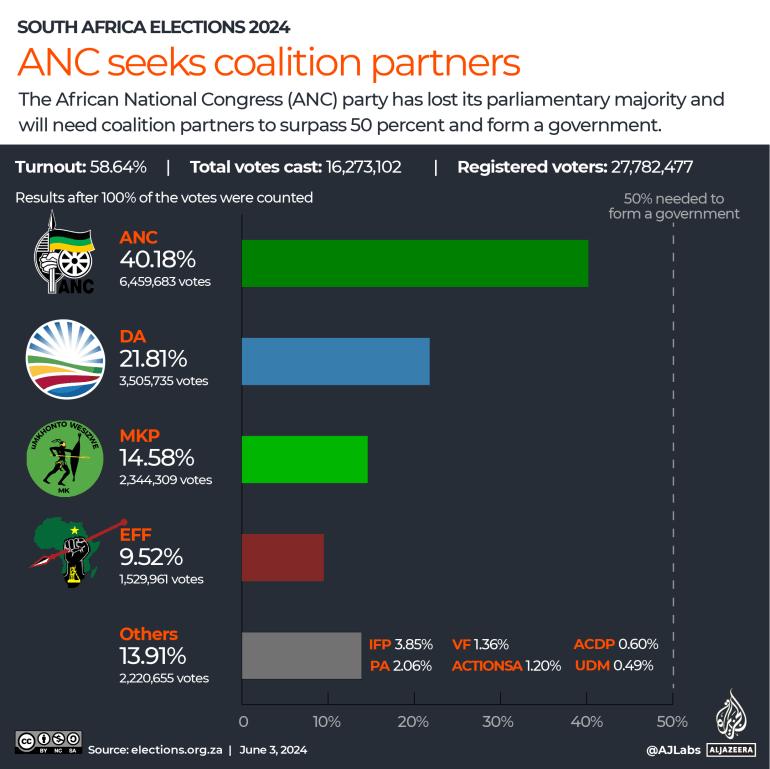Source: ALJAZEERA
ALJAZEERA MEDIA NETWORK

President Ramaphosa suggests a national unity government to navigate South Africa through challenging times following ANC’s electoral decline.
Johannesburg, South Africa — In the face of its most significant electoral defeat in three decades, South Africa’s ruling African National Congress (ANC) announced on Thursday its plan to form a “Government of National Unity” to govern the country.
After intensive party discussions, President Cyril Ramaphosa addressed the ANC’s national executive committee (NEC) late Thursday, stating that South Africa is at a “critical juncture” that demands exceptional leadership. In last week’s elections, the ANC lost its majority in South Africa’s parliament for the first time since apartheid ended.
“We, therefore, agreed to invite political parties to form a Government of National Unity as the best option to move our country forward,” Ramaphosa declared.
This essentially means that the ANC will seek a wide-ranging coalition involving several political parties rather than forming a direct coalition with its primary competitors, the Democratic Alliance (DA) and the Economic Freedom Fighters (EFF).
Although Ramaphosa presented this idea as being in the national interest, analysts suggest it is also a strategic move to minimize the ANC’s reliance on any single political adversary.
 INTERACTIVE - South Africa elections results map-1717388781
INTERACTIVE - South Africa elections results map-1717388781
South Africa experienced a Government of National Unity from 1994 to 1997 when former President Nelson Mandela included former apartheid Prime Minister FW de Klerk and members from rival parties in his cabinet.
Now, 30 years later, the ANC must negotiate a new agreement with other parties before the June 18 constitutional deadline to elect the next president. The ANC’s vote share plunged from 57 percent in 2019 to 40 percent in the recent election, also losing its majority in key provinces like KwaZulu-Natal and Gauteng.
Party leaders have engaged in intense discussions to identify viable government formation options, while youth organizations protested against a potential deal with the DA outside the NEC meeting.

The DA is often labelled as “anti-transformation” by ANC members due to its market-oriented policies, which they view as “anti-poor.” The ANC positions itself as a centrist, pro-poor party.
Maxine Rubin, a research fellow at the GIGA Institute of African Affairs, noted that Ramaphosa faces the challenge of finding coalition partners who do not compromise his own position within the ANC or force major policy compromises.
Exclusive coalition agreements with either the DA, EFF, or the new MK Party led by former President Jacob Zuma could have undermined these goals, potentially causing internal discord. The MK Party has stated it will only cooperate with the ANC if Ramaphosa is removed.
A broad coalition that includes the DA and other smaller parties would prevent an over-reliance on any single partner.
“This sends a positive signal to both domestic and international business communities,” Rubin added. The DA is particularly seen as business-friendly.
The DA garnered 21 percent of the vote, while the MK Party and EFF obtained 14 percent and 9 percent, respectively.

 INTERACTIVE - South Africa elections results 2024-1717388721
INTERACTIVE - South Africa elections results 2024-1717388721
Concerns extend beyond Ramaphosa’s political future or the confidence of international investors. Political analyst Ongama Mtimka pointed out that forming an alliance exclusively with either the DA on the right or the EFF and MK Party on the left could impact the ANC’s internal power dynamics, which could influence market perceptions of the South African government.
Mtimka added that a coalition with the DA could spur an “internal rebellion” within the ANC.
“Aligning with the right opposes the liberation movement’s myths and traditions,” he explained.
While specifics of the proposed unity government are yet to be detailed, Ramaphosa mentioned that the new administration will address the prevailing national conditions.
South Africa is grappling with significant domestic challenges, including economic growth, job creation, and structural inequality. The World Bank identifies South Africa as the world’s most unequal society, with severe poverty on one side and substantial wealth on the other. It also has the highest unemployment rate globally at 33 percent, and youth unemployment stands at 45 percent. Additionally, the country faces frequent power outages and severe corruption.

Ramaphosa affirmed that a national unity government would prioritize building an inclusive economy, generating jobs, combating corruption, and improving service delivery.
However, assembling this grand coalition by June 18 will be challenging. The ANC must negotiate positions in the executive and parliament in exchange for support from opposition parties and commit to reforms, such as stricter measures against corruption.
While the DA is open to discussions with the ANC, it has excluded any agreement with the EFF.
The EFF has indicated a willingness to co-govern with the ANC but demands the deputy presidency in return for their support. The MK Party refuses to join an ANC-led coalition with Ramaphosa as the leader and campaigns for constitutional amendments, which the ANC opposes.
Ramaphosa emphasized the need for social cohesion after a “particularly toxic and divisive” election campaign. As ANC negotiators engage with other political parties, the party remains steadfast that constitutional principles are non-negotiable.
“In establishing a GNU, we are building on a rich history of cooperation across divides and ideologies,” Ramaphosa stated. “We are drawing on an experience familiar to South Africans that served the country well.” This experience is now up for another test.
Your email address will not be published. Required fields are marked *